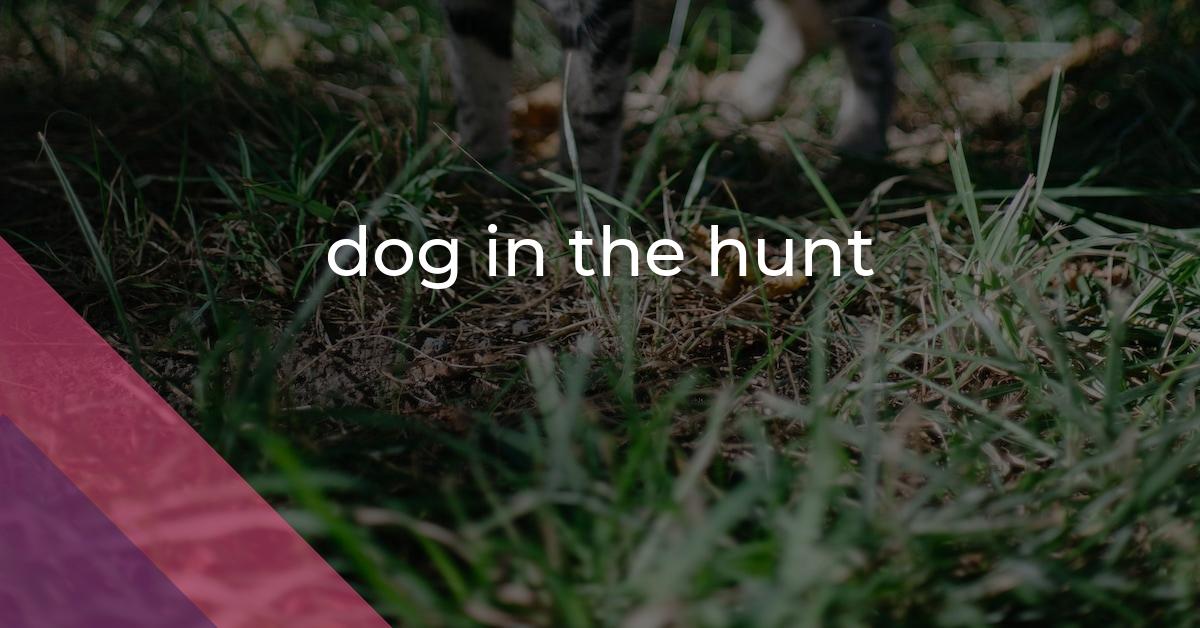dog in the hunt: Idiom Meaning and Origin
What does ‘dog in the hunt’ mean?
The idiom dog in the hunt means someone who is actively involved or participating in a particular situation or activity.

Idiom Explorer
The idiom "on the prowl" means to be actively hunting or searching for something, often with a sense of stealth or intention. It is commonly used to describe someone who is looking for a romantic or sexual partner.
The idiom "eyes on the prize" means to keep one's focus and attention on achieving a goal or desired outcome in order to be successful.
The idiom "dog-tired" means to be extremely exhausted or very tired. It is believed to originate from the behavior of dogs, which often sleep for long periods of time. The term "dog-tired" emphasizes the level of fatigue, emphasizing how tired one feels.
The idiom "dog that caught the car" refers to someone who has achieved a goal but is uncertain about what to do next or ill-prepared to handle the situation. It emphasizes the feeling of being overwhelmed or unprepared for the consequences of one's actions.
The idiom "dog's life" refers to a difficult and unpleasant existence, often characterized by hardship, struggle, or mistreatment.
The idiom "dog's chance" refers to having very little or no possibility of success or survival in a given situation.
The idiom "dog my cats" means that someone is surprised or shocked by something. It is often used to express disbelief or astonishment.
The idiom "dog in the manger" refers to someone who selfishly prevents others from enjoying or using something that they themselves do not need or want.
"Dog around" means to wander aimlessly, without a specific purpose or direction. It can also refer to procrastinating or wasting time instead of being productive.
Surprising Origins
The idiom "dog in the hunt" is a lesser-known phrase that originated in the United States. It is derived from the sport of fox hunting, which involves trained hunting dogs tracking and pursuing the fox. The phrase is typically used negatively to describe someone who is not actively participating in a particular activity, event, or situation.
In this idiom, "dog" refers to a hunting dog, while "hunt" refers to the act of pursuing and capturing prey. When someone is a "dog in the hunt," it suggests they are not actively involved or contributing, but rather just an observer or bystander.
Although this idiom is not as commonly used as others, it holds relevance in certain situations. It serves as a metaphorical representation of someone who is not actively engaged or involved. The idiom conveys a sense of detachment or disinterest, implying the person is there to watch or observe without any real intent or purpose.
The idiom "dog in the hunt" can be related to several other idioms, such as "on the prowl," "dog that caught the car," "chase after," "call off the dogs," and "chase one's tail." These idioms all touch on the themes of pursuit, engagement, and the outcome of one's actions.
The phrase "on the prowl" refers to someone actively seeking something or someone. It implies a sense of determination and focus, similar to a hunting dog on the hunt. When it comes to the idiom "dog in the hunt," however, the focus is on someone who is not actively seeking or pursuing.
A "dog that caught the car" is another related idiom. It describes a situation in which someone achieves what they were seeking but then realizes they are unsure of what to do next. While this idiom shares the concept of pursuit, it differs from "dog in the hunt" in that it highlights the unexpected consequences or lack of direction after achieving a goal.
"Chase after" is a common idiom used to describe the act of pursuing something or someone. It signifies energy and enthusiasm in the pursuit. In contrast, "dog in the hunt" implies a lack of energy or enthusiasm. The idiom suggests that the person is not actively chasing after anything and is instead content to stay on the sidelines.
"Call off the dogs" is an idiom used when someone wants to stop pursuing or pressuring someone else. It signifies a desire to end the pursuit or aggression. In relation to "dog in the hunt," this idiom further emphasizes the passive role of the person described. They are not the ones pursuing or pressuring, but rather the ones who need the pursuit to stop or be called off.
"Chase one's tail" is an idiom used to describe someone engaging in futile or repetitive actions. It conveys a sense of aimlessness or lack of progress. This idiom contrasts with "dog in the hunt" as it focuses on someone actively engaged in a repetitive action, while the latter suggests someone who is not engaged at all.
Despite its lesser-known status, the idiom "dog in the hunt" remains a concise and evocative way to describe someone's detachment from a situation. Its origins may remain a mystery, but its significance as a metaphorical expression endures. The idiom relates to other idioms, such as "on the prowl," "dog that caught the car," "chase after," "call off the dogs," and "chase one's tail," all of which provide further nuances to the theme of pursuit and engagement. Whether actively pursuing or passively observing, these idioms capture the complexities of human involvement and disengagement in various situations.
Example usage
Examples of how the idiom "dog in the hunt" can be used in a sentence:
- Even though she was new to the team, she quickly proved herself to be a dog in the hunt by consistently outperforming her colleagues.
- The manager knew he had a dog in the hunt when he saw how dedicated and enthusiastic his team was about completing the project.
- Despite facing numerous obstacles, the determined athlete never gave up and continued to be a dog in the hunt, pushing herself to achieve her goals.
More "sports" idioms



